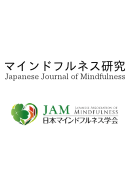Mindfulness-based intervention has been found to be effective in reducing social anxiety symptoms, but it is unclear which of its components affect the cognitive processes involved in social anxiety and how they do it. This study examined how brief focused-attention (FA) and open-monitoring (OM) meditation which consist of mindfulness meditation affects anxiety at the trait and state levels, as well as attention regulation and decentering. Twenty undergraduate and graduate students with social anxiety tendencies were assigned to “FA,” “OM,” or “Wait List” groups. Participants performed online speech tasks similar to tasks performed during online job interviews before and after a six-day meditation or waiting period. We found that (a) the OM group exhibited reduced social anxiety tendencies; (b) a greater number of FA group participants reported decreased subjective state anxiety and the efficacy of meditation in the second speech task; (c) meditation trainings had no effect on attention regulation or decentering. These results suggest that brief FA and OM meditations have differing impacts on social anxiety, either at the trait or state level. These meditations’ putative functioning processes were discussed.
View full abstract
